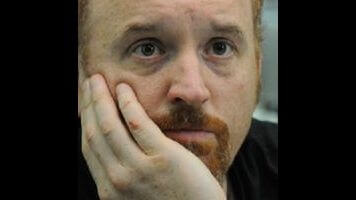C.K. also talked about the first three seasons being a trilogy, with season four being the start of a new one. There’s something to that, but Louie feels the same throughout. Told in short episodes, it’s loosely based around C.K.’s persona, a somewhat schlubby, single, middle-aged comedian and divorced father of two girls living in New York City. He hosts a poker game for some comic friends, he has bizarre encounters with neighbors, the outside world is surreal and alienating. Nobody’s happy to see Louie. Sudden hostility is as common and perplexing as a stranger’s non sequitur. The defining motif of the series is a medium shot of Louie’s face, head askew, looking totally befuddled by the world. Louie’s subjectivity—muffled dialogue, exaggerated close-ups, dialogue structured like battle, all conspiring to alienate its hero—sometimes evokes Roman Polanski’s short films.
But Louie doesn’t have Polanski’s fangs, and he’s certainly not as focused on power and sex. The overlap has to do with the way Louie peers into the abyss, grappling with subjects beyond the scope of the typical half-hour comedy. He’s not obsessed with death like Woody Allen, but he certainly has a preoccupation with mortality. The first episode of the new season culminates in a characteristic bit of Louie philosophy when a doctor tells Louie he’s going to have back pain for the next 20,000 years until Homo sapiens evolves a spine that was meant to be erect. Meanwhile his children have an assignment to write a letter to AIDS. Obvious or not, Louie feels like an expression of its protagonist’s brain, the “Dear AIDS” letter the kind of thing he might think up on a half-asleep walk to the bathroom at night.
As for season four being the start of a new trilogy, what stands out is the daylight. Historically, Louie has followed a late-night logic where a certain strangeness and honesty is accepted, even in its daytime plots. Take Louie’s confrontations with a bully’s family or a manic date, his sunrise breakfast with the girls or his sunset trip to Miami, his three-part talk show trial—Louie has always felt like a journey into night. In the first four episodes of season four, Louie faces everything during the day. Embarrassing situations, existential confrontation, social crystallizing moments, the comedy, the terror, the compassion. Perhaps that explains a rare moment of sweeping social commentary when Louie plays a black-tie benefit for heart disease. It feels almost beneath Louie to go so broad rather than deep, but in the light of day it plays. Besides, the earthly matters are just a piece of Louie’s cosmic design. Wealth and power may own him and the rest of us, but life’s a bitch regardless.
Discussion of almost every high point in the first four episodes is embargoed except for the centerpiece of the third episode, “So Did The Fat Lady.” In the first half, Louie meets a new waitress named Vanessa (Sarah Baker) at the Comedy Cellar, and in such cramped corridors, only Vanessa’s head fits into frame at first. She wins the audience over with her personality before the series ever shows her body. She’s so cool she doesn’t skip a beat when Louie rejects her romantically. Eventually he does agree to go get coffee with her, which turns into a whole day of walking around, getting to know one another. And then he tries to euphemize her weight, and everything just stops. The camera spins around so that it’s looking back at them instead of ahead. Joggers pass by. Vanessa doesn’t ream him or leave or move on. She lingers on that moment, breaks it down, builds off it. She has one line—a few, actually—that cuts right to the core. Louie is such a humane show that it takes this one interaction, awkward to him, lacerating to her, and stretches it to fill the rest of the episode. It rips the exchange open and crawls inside to really get a feel for what just happened, and what it means, and why. And still things don’t go quite as expected. Louie doesn’t look so bleak in the sunlight, and the day is just beginning.


 Keep scrolling for more great stories from A.V. Club.
Keep scrolling for more great stories from A.V. Club.